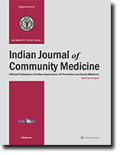
JOURNAL OF ENVIRONMENTAL HEALTH
Scope & Guideline
Transforming Research into Policy for Better Health
Introduction
Aims and Scopes
- Public Health and Environmental Protection:
The journal emphasizes research that links environmental factors to public health outcomes, focusing on how environmental hazards affect community health. - Workforce Development and Capacity Building:
It seeks to strengthen the skills and capabilities of the environmental health workforce through educational resources, training programs, and professional development initiatives. - Policy and Regulation:
The journal explores the impact of environmental health policies, regulations, and best practices, providing insights for policymakers and practitioners. - Community Engagement and Applied Research:
Encouraging community-based participatory research, the journal highlights studies that involve local populations in identifying and addressing environmental health issues. - Emerging Environmental Challenges:
The focus includes addressing contemporary environmental health challenges such as climate change, pollution, and food safety, providing innovative solutions and strategies.
Trending and Emerging
- Impact of Climate Change on Health:
There is a rising emphasis on understanding the health implications of climate change, including its effects on vulnerable populations and the need for adaptive public health strategies. - Integration of Technology in Environmental Health:
The adoption of technology, including artificial intelligence and data analytics, is increasingly being explored as a means to improve environmental health practices and decision-making. - Equity and Environmental Justice:
Research focusing on equity and justice in environmental health is gaining traction, addressing disparities in exposure to environmental hazards and advocating for marginalized communities. - Food Safety Innovations:
Emerging studies are prioritizing innovative approaches to food safety, including the use of technology and community engagement to enhance foodborne illness prevention. - Mental Health and Environmental Factors:
The exploration of the connections between environmental conditions and mental health outcomes is becoming a significant area of interest, reflecting a broader understanding of health as a holistic construct.
Declining or Waning
- Traditional Water Quality Assessments:
While water quality remains important, the emphasis on traditional assessment methods has waned in favor of more integrated and innovative approaches to managing water safety and public health. - General Environmental Health Education:
There is a noticeable shift away from general education topics towards more specialized training and capacity-building initiatives tailored to specific environmental health challenges. - Local Case Studies:
The prevalence of localized case studies has decreased, as researchers increasingly focus on broader, systemic issues affecting multiple regions or populations. - Basic Food Safety Protocols:
Research directly addressing basic food safety measures has become less frequent, with a growing trend towards exploring complex interactions between food systems and public health.
Similar Journals

Lancet Planetary Health
Bridging disciplines to tackle planetary health challenges.Lancet Planetary Health is a distinguished, open-access journal published by Elsevier Science Ltd, focusing on critical intersections between global health and environmental sustainability. Launched in 2017 and located in the Netherlands, this journal has quickly established itself as a leading platform for innovative research, evidenced by its Q1 ranking across multiple categories in 2023 including Health Policy, Public Health, and Environmental and Occupational Health. With an impressive Scopus ranking, placing it in the top 1% of similar journals, Lancet Planetary Health aims to foster interdisciplinary conversation and collaboration among researchers, policymakers, and practitioners dedicated to addressing the health challenges posed by climate change and environmental degradation. The open access model not only enhances the visibility of published research but also promotes widespread dissemination of knowledge, making it an essential resource for anyone committed to advancing the field of planetary health.

JOURNAL OF RURAL HEALTH
Advancing Evidence-Based Practices for Rural Wellbeing.JOURNAL OF RURAL HEALTH, published by WILEY, serves as a leading platform for research in the dynamic field of rural health, encompassing both public health and environmental studies. With an impressive impact factor and a ranking of #75 out of 665 in the Scopus database for Public Health, it stands prominently in the Q1 category, reflecting its high-quality contributions to the discipline. Established in 1985, this journal targets the unique challenges and innovations in rural healthcare, making it essential reading for researchers, practitioners, and policymakers aiming to enhance health outcomes in less accessible areas. Although this journal is not open access, it disseminates vital research that informs evidence-based practices and policies aimed at improving rural health systems. For anyone engaged in or studying rural health, this journal is an invaluable resource to stay abreast of the latest findings and trends.

Journal of Environmental Science and Management
Innovating solutions for sustainable management practices.Journal of Environmental Science and Management, published by the University of the Philippines Los Baños College, serves as a vital platform for disseminating research findings and innovations in the field of environmental science and management. With an ISSN of 0119-1144, this journal aims to foster multidisciplinary discussions and advancements in sustainability practices and environmental policy, primarily focusing on the unique challenges faced in the Philippines and similar ecological contexts. Despite being categorized in the Q4 quartile for Environmental Science (miscellaneous) and holding a SCOPUS rank of #191/233, it provides crucial insights and practical solutions for a diverse audience ranging from researchers to policymakers. While it does not currently operate under an open-access model, its commitment to quality research continues to make it a notable source in the environmental science community. The journal covers a broad timeframe from 2011 to 2024, capturing evolving dynamics in the environmental landscape. Contributing to this journal not only enhances the visibility of local and regional environmental research but also aids in addressing global environmental challenges.

ACS Environmental Au
Pioneering Open Access Research in Environmental ScienceACS Environmental Au is a leading open-access journal published by the American Chemical Society (ACS), dedicated to advancing research in the environmental sciences. Since its inception in 2021, this journal has quickly established itself in the highly competitive landscape of environmental research, achieving Q1 status across multiple categories—Environmental Engineering, Environmental Science (Miscellaneous), and Water Science and Technology. With a strong Scopus ranking, including Rank #38 in Water Science and Technology representing the top 85th percentile, ACS Environmental Au serves as a vital platform for disseminating high-quality research and innovative solutions to pressing environmental challenges. It is particularly notable for its commitment to accessibility, providing researchers, professionals, and students with open access to critical findings that support sustainable development and environmental stewardship. This journal not only emphasizes rigorous scientific inquiry but also seeks to provoke thoughtful discourse and collaborative initiatives that address global environmental issues.

Indian Journal of Community Medicine
Empowering Public Health Solutions for Diverse CommunitiesIndian Journal of Community Medicine, with its ISSN 0970-0218 and E-ISSN 1998-3581, operates under the esteemed Wolters Kluwer Medknow Publications. This peer-reviewed, open access journal, established in 2005, has been at the forefront of disseminating research in the fields of public health, community medicine, and environmental health, forging connections among researchers, practitioners, and policymakers in India and beyond. With a notable impact factor and a Q3 ranking in Public Health, Environmental and Occupational Health for 2023, this journal maintains a commitment to improving community health through empirical research, policy analysis, and best practice sharing. The journal is pivotal not only in addressing prevalent health issues but also in fostering innovative solutions tailored to the unique challenges faced by diverse communities. With publication convergence from 2009 to 2024, the Indian Journal of Community Medicine continues to serve as a vital resource for academics, professionals, and students looking to contribute to and engage with the evolving landscape of community health research.

ENVIRONMENTAL HEALTH PERSPECTIVES
Pioneering discoveries that shape environmental health policy.Environmental Health Perspectives (EHP) is a premier open-access journal published by the U.S. Department of Health and Human Services, Public Health Science, dedicated to publishing rigorous and impactful research in the field of environmental health. Since its inception in 1972, EHP has become a leading platform for disseminating knowledge on the interactions between the environment and human health, making significant contributions to the fields of toxicology and public health. With an impressive impact factor and a Q1 ranking in both Health, Toxicology and Mutagenesis and Public Health, Environmental and Occupational Health categories, EHP ranks among the top journals globally, reflecting its high citation and visibility within the academic community. Researchers, professionals, and students alike will find a wealth of vital information within its pages, as EHP covers a wide array of topics related to environmental exposures, health outcomes, and policy implications. Furthermore, EHP engages with a global audience through its commitment to open access, ensuring that critical research is available to all, enhancing the collective understanding of environmental health issues since 1972.

Human Resources for Health
Transforming healthcare delivery via workforce excellence.Human Resources for Health, published by BMC, stands as a premier open-access journal dedicated to the vital intersection of human resources and health systems. With an impressive history since 2003, this journal has become a significant contributor to the fields of Public Administration and Public Health, earning a distinguished position in the top quartile rankings (Q1) of both categories in 2023. With a focus on advancing the understanding of workforce management and health policy, it serves as a critical platform for researchers, practitioners, and policymakers committed to enhancing health systems globally. The journal's notable impact is reflected in its Scopus rankings, where it is placed in the 92nd percentile for Public Administration and the 90th percentile for Public Health, underscoring its relevance and influence in contemporary discourse. The open-access model facilitates widespread dissemination of knowledge, ensuring that cutting-edge research is accessible to a diverse audience. As we move towards 2024, Human Resources for Health continues to strive for excellence, offering a wealth of knowledge that is essential for shaping the future of healthcare delivery and workforce development.

Current Environmental Health Reports
Transforming research into actionable solutions for public health.Current Environmental Health Reports, published by SpringerNature, is a leading journal dedicated to advancing research in the multifaceted domains of environmental health. With an impressive impact factor and a distinguished Q1 ranking in several categories—such as Health, Toxicology and Mutagenesis, Public Health, and Environmental Science—this journal provides a premier platform for scholars, researchers, and professionals to disseminate their findings. Since its inception in 2014, it has showcased critical studies that address pressing environmental issues, health risks, and regulatory frameworks, guided by a commitment to high-quality research and policy dialogue. Whether through original research articles, reviews, or policy perspectives, Current Environmental Health Reports strives to inform and influence practice and public policy in environmental health, making it an essential resource for those engaged in this vital field. Accessible only through institutional subscriptions, the journal continues to illuminate the interplay between environmental factors and human health through innovative and impactful scholarship.

Journal of Integrative Environmental Sciences
Shaping the future of environmental science and public health.Journal of Integrative Environmental Sciences, published by Taylor & Francis Ltd, stands as a pivotal platform for researchers and professionals in the fields of Environmental Science and Public Health. With an impact factor reflecting its significance in the academic community, this Open Access journal has been democratizing access to cutting-edge research since 2016, enhancing visibility and dissemination of vital insights. The journal covers a wide scope, converging studies from 2010 to 2024, and holds esteemed rankings in Q2 quartiles for Environmental Science and Public Health, indicating its substantial contribution to these critical fields. With Scopus rankings placing it favorably among its peers, researchers benefit from a diverse array of articles addressing pressing environmental and health issues, sustainability, and renewable energy. As an essential resource for advancing knowledge and fostering innovation, the Journal of Integrative Environmental Sciences encourages contributions that span interdisciplinary approaches to solving some of the most challenging environmental dilemmas of our time.

Environmental Research Letters
Innovating pathways to environmental resilience.Environmental Research Letters is a premier, peer-reviewed journal published by IOP Publishing Ltd based in the United Kingdom, dedicated to advancing the field of environmental science. With an impressive Impact Factor and consistently ranked in the Q1 category for its focus on Environmental Science, Public Health, and Renewable Energy, this open-access journal has been a vital resource for researchers and practitioners since its inception in 2006. Covering a wide scope of topics including sustainability, environmental health, and innovative energy solutions, ERL aims to promote discourse and disseminate groundbreaking research that addresses global environmental challenges. As a leader in the field, it holds prestigious positions in Scopus rankings, ensuring that published works reach a wide audience, thus driving impactful change. Researchers, professionals, and students alike will find valuable insights and essential knowledge within its pages, making it a keystone publication for anyone invested in environmental advancements.